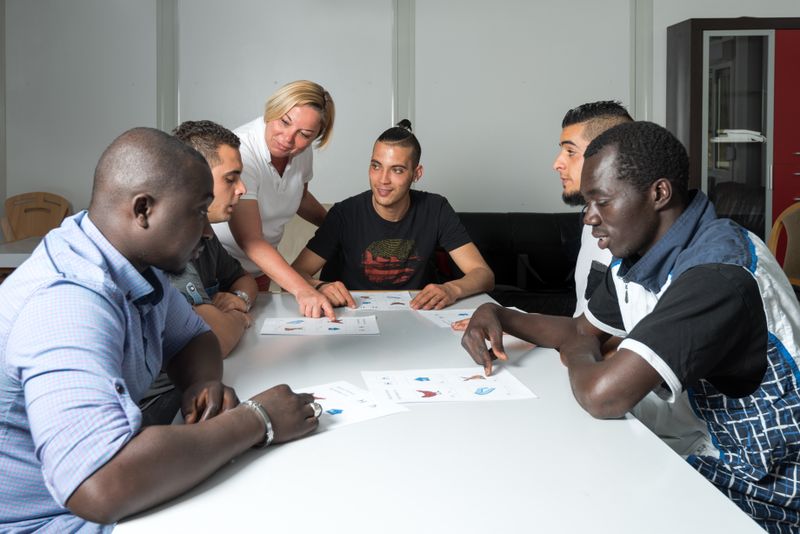Migration and mobility
The internal free movement of labour is a cornerstone of the EU policy agenda for some years, with the underlying objectives of encouraging cross-country exchanges and balancing differences related to specific national systems. Both migration and mobility are necessary for addressing skills imbalances and responding to labour market demands. Mobility provides opportunities for EU citizens.

Latest
Find the latest content on this topic below.
20 October 2025
23 September 2024
This report examines convergence in human capital – specifically that of individuals with tertiary education – in the EU, analysing three phases: creation, utilisation in the labour market and mobility. The analysis finds that Member States are performing better in creating human capital through education but finds disparities in the other two phases, with differences in labour market opportunities resulting in different mobility flows. A cost estimate exercise reveals that a country’s lack of attractiveness to talented individuals has economic repercussions, and that loss of human capital through emigration is not balanced by returning or incoming talent. If the imbalance in human capital circulation in the EU is not addressed, this may hurt convergence, leaving Member States and regions without the skills to negotiate the twin transition successfully. An examination of policies to attract talent illuminates the need for long-term initiatives and to link them with labour market opportunities.
28 March 2024
This report focuses on the challenges that the EU Member States and Norway face when receiving and integrating refugees who fled Ukraine after Russia’s invasion in February 2022. It investigates their labour market integration and access to and experiences with public services that are crucial for societal inclusion. The main aim is to explore and highlight the interplay between different areas of integration: employment, housing arrangements, healthcare (including mental health care), access to childcare and social assistance. The report uses information collected by Eurofound from the Member States and Norway and covers developments up to mid-2023. It examines the following issues: employment levels and barriers to labour market access for Ukrainian refugees; support measures for labour market integration; and the ways in which the Member States and Norway facilitate access to key services (housing, education, healthcare and social assistance) and the challenges that have to be overcome in this regard.
About Migration and mobility
Learn more about this topic and its relevance for EU policy making.
Highlights for Migration and mobility
This is a selection of the most important outputs for this topic.
28 March 2024
Social impact of migration: Addressing the challenges of receiving and integrating Ukrainian refugees
This report focuses on the challenges that the EU Member States and Norway face when receiving and integrating refugees who fled Ukraine after Russia’s invasion in February 2022. It investigates their labour market integration and access to and experiences with public services that are crucial for societal inclusion. The main aim is to explore and highlight the interplay between different areas of integration: employment, housing arrangements, healthcare (including mental health care), access to childcare and social assistance. The report uses information collected by Eurofound from the Member States and Norway and covers developments up to mid-2023. It examines the following issues: employment levels and barriers to labour market access for Ukrainian refugees; support measures for labour market integration; and the ways in which the Member States and Norway facilitate access to key services (housing, education, healthcare and social assistance) and the challenges that have to be overcome in this regard.
14 June 2023
Barriers to employment of displaced Ukrainians
In responding to Russia’s war against Ukraine, the EU activated its Temporary Protection Directive (TPD) for people who fled the country, allowing them to settle in the EU and to access basic public services and the labour market. By spring 2023, more than 4.5 million people had made use of the TPD or similar national protection schemes in the EU. In 2022, the European Union Agency for Fundamental Rights conducted an online survey among people displaced from Ukraine. Eurofound has analysed the survey results on their experiences when seeking to access employment. This paper highlights the main barriers that displaced people encountered and suggests ways to facilitate their inclusion.
20 October 2021
Watch the video - Joint webinar: Equality and inclusion in a post-pandemic EU
25 June 2020
Racial discrimination is not a thing of the past in the EU
27 November 2019
How your birthplace affects your workplace
Employment statistics consistently show that having a foreign background has an influence on people’s employment prospects. Less is known about the types of jobs workers with foreign backgrounds hold and their working conditions. This policy brief contributes to filling this gap. It compares the experience of workers with a foreign background to that of native workers; it also distinguishes between the experiences of first-generation and second-generation migrants and between those of women and men.
The evidence shows that having a foreign background can have a negative impact both on labour market integration and working conditions. However, significant differences emerge between different groups of migrants. The findings highlight the clear need for a nuanced approach to policymaking to ensure a level playing field in the labour market for workers with a foreign background.
19 June 2019
Role of public services in integrating refugees and asylum seekers
Following the influx of over three million asylum seekers into the European Union in the three-year period 2015–2017, Member States faced a number of challenges related to integrating the newly arrived into their country. This report explores the role of public services – specifically housing, social services, health and education services – in the social and economic integration of refugees and asylum seekers. It aims to identify the factors that hinder this process and the elements that contribute to successful integration. The overall focus is on destination countries, particularly the three countries most affected by the inflow of refugees and asylum seekers: Austria, Germany and Sweden.
Experts on Migration and mobility
Researchers at Eurofound provide expert insights and can be contacted for questions or media requests.
Eleonora Peruffo
Research officerEleonora Peruffo is a research officer in the Social Policies unit at Eurofound. She works on topics related to upward convergence and social cohesion in Europe. During 2021–2022, she provided data analysis for the European Working Conditions Telephone Survey (EWCTS). She joined Eurofound in 2014 and has worked on topics related to restructuring, employment and digitalisation. She holds an MA in Diplomatic Sciences and International Relations awarded by the University of Trieste and an MSc in Computer Science - Data Analytics from the National College of Ireland.
Karel Fric
Research officerKarel Fric is a research officer in the Social Policies unit at Eurofound. His work involves survey research, data analysis and project management, with a particular focus on working and living conditions, equality and discrimination. He previously worked as a researcher at the European Union Agency for Fundamental Rights in Vienna, Austria, and at Panteia, a research and consulting organisation based in Zoetermeer, the Netherlands. Karel holds a PhD in Social Sciences from Erasmus University Rotterdam and a Master’s degree in Economics from Utrecht University.
All content for Migration and mobility
This section provides access to all content that has been published on the topic.
&w=3840&q=75)


&w=3840&q=75)
&w=3840&q=75)
&w=3840&q=75)